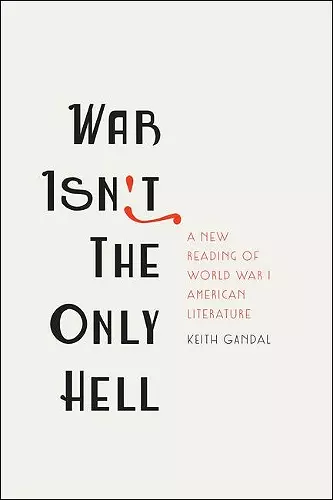War Isn't the Only Hell
A New Reading of World War I American Literature
Format:Hardback
Publisher:Johns Hopkins University Press
Published:18th May '18
Currently unavailable, and unfortunately no date known when it will be back

A vigorous reappraisal of American literature inspired by the First World War.
American World War I literature has long been interpreted as an alienated outcry against modern warfare and government propaganda. This prevailing reading ignores the US army’s unprecedented attempt during World War I to assign men—except, notoriously, African Americans—to positions and ranks based on merit. And it misses the fact that the culture granted masculinity only to combatants, while the noncombatant majority of doughboys experienced a different alienation: that of shame.
Drawing on military archives, current research by social-military historians, and his own readings of thirteen major writers, Keith Gandal seeks to put American literature written after the Great War in its proper context—as a response to the shocks of war and meritocracy. The supposedly antiwar texts of noncombatant Lost Generation authors Dos Passos, Hemingway, Fitzgerald, Cummings, and Faulkner addressed—often in coded ways—the noncombatant failure to measure up.
Gandal also examines combat-soldier writers William March, Thomas Boyd, Laurence Stallings, and Hervey Allen. Their works are considered straight-forward antiwar narratives, but they are in addition shaped by experiences of meritocratic recognition, especially meaningful for socially disadvantaged men. Gandal furthermore contextualizes the sole World War I novel by an African American veteran, Victor Daly, revealing a complex experience of both army discrimination and empowerment among the French. Finally, Gandal explores three women writers—Katherine Anne Porter, Willa Cather, and Ellen La Motte—who saw the war create frontline opportunities for women while allowing them to be arbiters of masculinity at home. Ultimately, War Isn’t the Only Hell shows how American World War I literature registered the profound ways in which new military practices and a foreign war unsettled traditional American hierarchies of class, ethnicity, gender, and even race.
Gandal's study is enlightening and will be a valuable resource for studying the Great War.
—Choice
[Gandal] shows how unsatisfactory wartime experiences informed the fiction of a range of writers, including William Faulkner and Ernest Hemingway, both of whom lied about their military roles in later years.
—Lawrence D. Freedman, Foreign Affairs
The book is correct to claim that future scholars of Great War American literature will have to take these different military classifications into account. Combatants and noncombatants did experience service differently, just as soldiers who fought in the trenches experienced battle differently from those who did not. And just as importantly, Gandal's book should also be praised for bringing back into the light of day several excellent primary texts that have sadly sunk into obscurity.
—Aaron Shaheen, University of Tennessee at Chattanooga, Studies in the Novel
Gandal's latest effort provide[s] needed extended analysis into a complicated war . . . Although Gandal offers insights into women writers of the period, as well as African American writers such as Victor Daly, it is the combatant/noncombatant paradox that drives the book, resulting in a much more complex reading and history of American Great War literature than in traditional analyses.
—Ross K. Tangedal, University of Wisconsin-Stevens Point, The F Scott Fitzgerald Review
Gandal suggests that the conventional binary classification of World War I literature as either pro- or antiwar has in fact distracted us from signal differences between combatant and noncombatant experiences of war. . . . Gandal persuasively reads A Farewell to Arms, together with other major modernist works, as validating the particular resentments and disappointments of a vast audience of veterans who served in noncombatant roles rather than as speaking to the comparatively few American soldiers who actually served in combat during this conflict. The caste system elevating combat roles, on the one hand, over combat support and combat service support functions, on the other, persists today in the US military. . .
—Elizabeth D. Samet, United States Military Academy, American Literary History
ISBN: 9781421425108
Dimensions: 229mm x 152mm x 24mm
Weight: 522g
288 pages